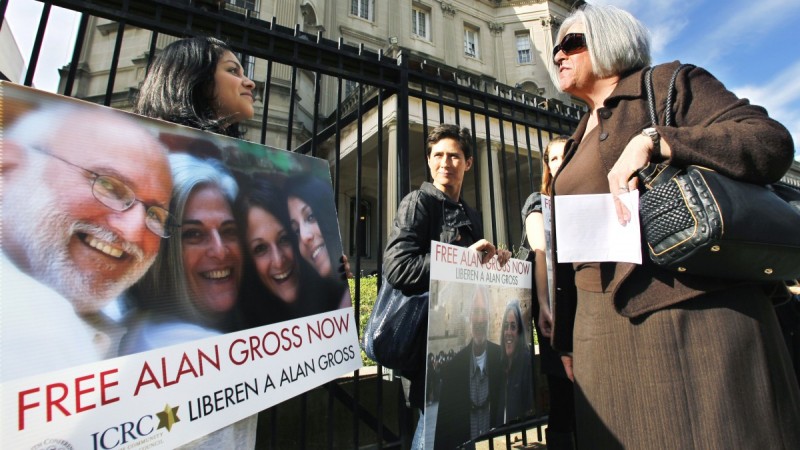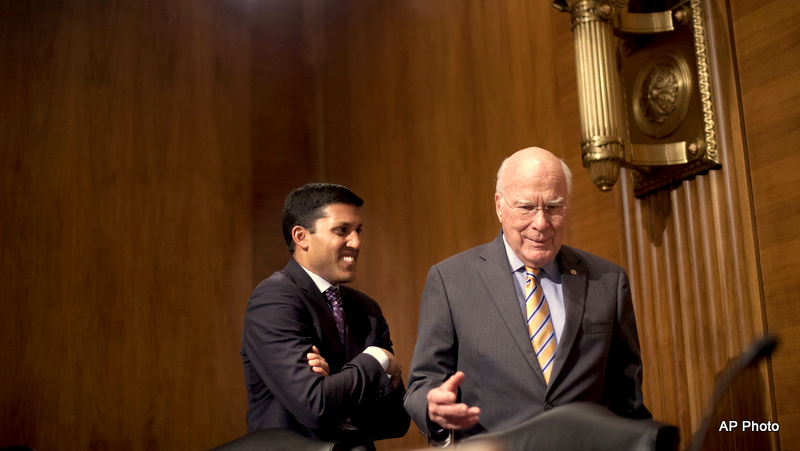The case of Alan Gross — the USAID subcontractor imprisoned in Cuba in 2011 for activities attempting to sabotage the Cuban Revolution — is sometimes juxtaposed, unfairly, with the case of the Cuban 5 — the Cuban intelligence agents unjustly imprisoned in the U.S. for their role in preventing terrorist attacks on Cuba.
The United States’ inability to overthrow Fidel Castro resulted in a series of violent terrorist attacks and attempts at sabotage. Among the worst of these attacks was the 1976 bombing of Cubana de Aviación Flight 455 — the work of former CIA agents Orlando Bosch and Luis Posada Carriles. As Miami-based counter-revolutionary forces increased their attacks against Cuba, the Cuban 5 — Gerardo Hernández, Antonio Guerrero, Ramón Labañino, Fernando González, and René González — were sent to Miami to gather intelligence and monitor the activities of exiled Cubans involved in counter-revolutionary activities.
The information they gathered was relayed to the U.S. government by a long-time friend of Fidel, acclaimed author Gabriel García Márquez, on May 6, 1998. With typical belligerence, the U.S. government dispatched an FBI team to discuss the findings with the Cuban government, which led to the subsequent arrests of the Cuban 5.
“Diplomatic compromise” is the key phrase in the purported solution proposed in mainstream media: freeing Gross in return for securing the freedom of the three remaining prisoners.
Asked whether the Cuban government would be interested in a prisoner swap during an interview with Democracy Now in 2012, Mariela Castro, daughter of Cuban President Raúl Castro, stated: “The Cuban government has expressed interest in finding a negotiated solution on humanitarian terms, and of course it is fully disposed to negotiate with the government of the United States. But it has not received any response.”
Media misrepresentation

The cases of Gross and the Cuban 5 are both misrepresented in U.S. mainstream media through language that diverts attention from the issues at stake — namely, the importance of acknowledging Gross as a USAID agent and the Cuban 5 as patriots defending their country from Miami-based terrorists.
Gross was sentenced to 15 years in prison for implementing subversive projects aimed at destabilizing Cuba’s socialist government. The U.S. claims of unjust imprisonment are little more than a propaganda mechanism that serves to foster anti-Cuban sentiment to prolong the blockade on Cuba and seeks to undermine the fact that Gross violated Cuban law. As Josefina Vidal, the general director of U.S. relations within the Cuban Ministry of Foreign Affairs, stated, Gross’ actions constituted an attempt at “destabilizing Cuba’s constitutional order through the establishment of illegal, undercover communications systems, with non-commercial technology.”
The argument brought forth by U.S. officials was that Gross was tasked with providing the Jewish community in Cuba with satellite phones and computer equipment. However, Gross had filed reports for USAID, the agency created under the Kennedy administration which disguises imperialist intervention under a banner of humanitarian aid. On his last trip to Cuba, Gross brought with him a chip that would prevent electronic transmission tracking. According a 2012 investigative report by The Associated Press, such equipment is “provided most frequently to the Defense Department and the CIA, but also can be obtained by the State Department, which oversees USAID.”
USAID relies upon its humanitarian shield in order to detract attention away from the actual objectives of the organization, which schedules its programs according to the broader U.S. agenda. In the case of U.S. propaganda against Cuba, freedom and democracy are convenient terms that have laid the foundation for decades of oppression against Fidel’s revolution, including terrorist attacks, attempts to counter the revolution, the embargo, over 600 attempts to assassinate Fidel, and the enduring wound of the case of the Cuban 5.
In response to the controversy ignited by a 2014 AP report on the ZunZuneo program, launched shortly after Gross was imprisoned in Cuba, USAID stated that “discreet does not equal covert.” The language is reminiscent of U.S. attempts to mellow imperialist intervention in various countries through terminology that not only neutralizes sabotage, but attempts to portray it as a necessity in the name of alleged freedom.
U.S. Sens. Jeff Flake and Tom Udall, who met with Gross, as well as Cuban Foreign Minister Bruno Rodriguez Parrilla this month, have reportedly been critical of the U.S. embargo on Cuba. However, the U.S. government’s decision to refuse any alternative solutions and insist upon Gross’ unconditional release may provide further insight into the imperialist tactics it uses against Cuba.
False premises
In 2013, U.S. Secretary of State John Kerry addressed the House Foreign Affairs Committee, stating, “Alan Gross is wrongly imprisoned. We are trying to work this out on a humanitarian basis. We are not going to trade as if it is a spy for a spy, which they are trying to allege.”
Three false premises stand out in the statement: “wrongly imprisoned;” “humanitarian basis;” and “a spy for a spy.”
The Cuban Revolution has, since its inception, declared its anti-imperialist stance. USAID, the agency that Gross was working for, has aimed to covertly create dissent in Cuba, in violation of Cuban law. To assert that he is “wrongfully imprisoned” despite evidence to the contrary illustrates the U.S. government’s efforts to hold on to Gross as a political weapon to maintain oppressive measures against the island nation.
Thus, the “humanitarian basis” as a straightforward claim is rendered obsolete. Imperialism and humanitarian concerns are incompatible, unless the humanitarian concerns are directly related to human rights abuses — abuses which the U.S. committed in excess against the Cuban population for its support of Fidel and the revolution.
Lastly, the rhetoric of releasing “a spy for a spy” is evidence of the manipulation of facts that shape U.S. propaganda. The USAID contractor is an “innocent victim” in propaganda rhetoric, albeit one abandoned by the imperialist scheme, thus serving to rebrand espionage in Cuba.
Different parameters
The Cuban 5 — “spies,” according to the United States’ hypocritical rhetoric — are victims of a decades-long imperialist plan to undermine the Cuban Revolution. Fernando González and René González are now back in Cuba, having served their unjust sentences in the U.S. The three remaining intelligence agents — Gerardo Hernández, Antonio Guerrero and Ramón Labañino — remain incarcerated for serving their country in line with the revolution against imperialist violence.
Yet international support for the Cuban 5 continues to grow, highlighting the importance of internationalist support in a political case which has been determined by imperialist dictates.
While the U.S. attempts to reinforce subjugation through the continued incarceration of the remaining three Cuban patriots, as well as possibly using the case of Alan Gross as yet another reason to refuse to lift the embargo, the scenario reinforces the different parameters within which the U.S. and Cuba function.
The U.S. continues to instigate and utilize terror in various forms against resistance in its quest for further domination. Cuba, on the other hand, has demonstrated, through the revolution, its commitment to defending the island and its people, as part of the process that has ensured the continuation of Cuban internationalism — both in solidarity with the oppressed and in defiance of the imperial power so close to its shores.
Feature photo | Senate subcommittee on State, Foreign Operations and Related Programs Chairman Sen. Patrick Leahy, D-VT., right, talks with US Agency for International Development (USAID) Administrator Dr. Rajiv Shah on Capitol Hill in Washington, Tuesday, April 8, 2014, following the committee’s hearing of the USAID’s fiscal 2015 budget. Photo | AP


